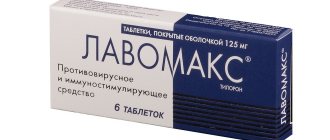Pencrofton is one of the antigestagen drugs that allows you to terminate an unwanted pregnancy by causing a medical abortion. Taken as prescribed by a doctor and under his supervision.
The cost of a medical abortion in our clinic is from 4,500 rubles. The price includes an initial ultrasound of the uterus, a doctor’s consultation and all necessary medications for abortion.
Make an appointment by phone: 8-800-707-15-60 (free call). *The clinic is licensed to perform abortions.
pharmachologic effect
Due to the presence of mifepristone in the drug Pencrofton, the drug is able to disable the functions of progesterone at the receptor level. Also, the drug does not have gestagenic activity.
Scientists have recorded antagonism between Pencrofton and glucocorticosteroids. It occurs due to competition between the active ingredients of these drugs at the receptor level.
The main function of the drug is to increase the sensitivity of the myometrium and activate its ability to contract. Due to this, the decidua peels off and the fetus is rejected during pregnancy.
After a single use of the drug in an amount of 600 mg, after 1.5 hours the maximum concentration of the drug in the body is reached in the amount of 1.98 mg/l. The bioavailability of Pencrofton is about 70%.
In plasma blood, the main substance, mifepristone, tends to establish a connection with protein components: acidic alpha-1-glycoprotein and albumin.
After the medicine has been distributed throughout the body, the elimination phase of the drug takes quite a long time: the concentration of mifepristone drops by 2 times within 3 days.
Further, the elimination of the drug occurs faster. The half-life of Pencrofton lasts about 18 hours .
How it works
The purpose of the drug is to stop the production of progesterone, a hormone that supports normal fetal development. The medicine increases the sensitivity of the myometrium - one of the layers of the uterus containing receptors - to prostaglandins. The active substance also increases the contractility of the organ.
At the same time as Pencrofton, I take prostaglandins, which cause miscarriage. The result of the effect of Pencrofton on the female body is the rejection of the fetus from the walls of the uterus.
The main condition for medical abortion is the correct use of medications:
- Dosages and dosages of Pencrofton must be observed. At one time, the doctor gives 600 mg of the drug. In this case, it starts working within an hour and a half.
- A second prostaglandin class medication should be given along with it. If these pills are not available, the abortion will most likely not take place. The result will be poisoning of the fetus, so you will have to either have a surgical abortion or give birth to a baby who will most likely develop dangerous pathologies.
The patient should take three tablets of the drug in the presence of a gynecologist, and monitor her health for the next few hours. After a certain time, the woman takes misoprostol, the mechanism of action of which is the removal of the fertilized egg from the uterus with menstrual flow, the density of which should be higher than usual.
Composition and release form
The medicine is available in tablets.
On pharmacy shelves, the drug Pencrofton is presented in the following packaging:
- In a polymer jar;
- In a glass jar;
- In a blister.
Regardless of the packaging form, each package of the drug contains 3 tablets of the product. They are light yellow in color with a hint of green. The shape of the tablets is flat-cylindrical.
The composition of the drug Pencrofton is presented:
- The main substance is mifepristone in the amount of 200 mg per 1 tablet;
- Excipients in the form of corn starch, milk sugar, silicon dioxide, calcium stearate, microcrystalline cellulose.
When is Pencrofton prescribed?
The content of the article
Pencrofton is prescribed both for medical abortion and as a means of inducing labor in late pregnancy. Mifeprex, mifepristone and mifegin are other variants of the names of this drug, which share the active substance mifepristone. This means that it has all the effects of these drugs.
The dosage form is pale yellow tablets, a green tint is allowed.
Indications for use
Doctors prescribe Pencrofton in the following clinical situations:
1. For medical termination of intrauterine pregnancy, which is in the early stages (when amenorrhea does not exceed 1 month).
Diagram that shows the features of medical abortion
2. In preparation for the birth process.
3. When induction of labor is required if its due date has already arrived and spontaneous labor is not observed.
"Pencrofton" and the opinion of experts
Doctors often prescribe Pencrofton for the purpose of early abortion, however, many of them are sure that it should only be used in cases where the patient is under the supervision of a doctor. This will significantly reduce the risk of side effects. Alas, many representatives of our medicine are not particularly scrupulous, so they simply prescribe the drug to the girls and send them home.
Despite the fact that Pencrofton is actively used in modern medicine, doctors' reviews about it are ambiguous - some actively prescribe it, others prefer to send patients for an abortion with curettage in order to completely clean out the upper mucous layer of the uterus. The residual parts of the fertilized egg may indeed not come out completely after bleeding begins and fester in the uterus, causing serious complications. Unfortunately, this can happen when using any abortion pills, not just Pencrofton. Reviews of inducing labor with this remedy will be discussed below.
Contraindications
The drug Pencrofton is not recommended for use in patients who have:
- Hypersensitivity to mifepristone;
- Adrenal insufficiency;
- Long-term course of glucocorticosteroids;
- Failure of the liver and renal apparatus (acute and chronic phase);
- Anemia;
- Porphyria;
- Uterine fibroids;
- Scar formations in the uterine area;
- Problems with hemostasis;
- Pathologies of the genital organs of an inflammatory nature;
- Lesions of various kinds of external genital organs.
Pencrofton should not be used independently by patients over the age of 35 without prior consultation with a gynecologist.
Additionally, there are prohibitions on the use of the drug in the case of medical abortion when:
- There is a risk of ectopic pregnancy;
- Pregnancy has not been clinically confirmed;
- Pregnancy was diagnosed while using intrauterine contraception;
- Pregnancy was recorded after excluding hormonal contraception.
Useful video:
Doctors prohibit taking Pencrofton in preparation for childbirth if the woman’s medical history contains:
- Preeclampsia, which is severe;
- Preeclampsia;
- Eclampsia;
- Premature pregnancy;
- Post-term pregnancy;
- Placenta previa;
- A large difference between the parameters of the patient’s pelvis and the fetal head;
- Incorrect position of the fetus in the womb;
- Bloody vaginal discharge of unknown etiology.
Patients with the following pathologies are prescribed Pencrofton with extreme caution:
- Bronchial asthma and other obstructive airway diseases;
- Hypertension (severe form);
- Heart failure;
- Problems related to heart rhythm.
Taking Pencrofton while breastfeeding
It is no secret that breastfeeding mothers, relying on natural hormonal protection from pregnancy associated with lactation, are not protected. That's why they get pregnant very often. If this happens, they are advised to have an abortion, since the body is not yet strong after childbirth, and carrying a new pregnancy is quite dangerous. Naturally, the choice falls on medical termination of pregnancy, since it carries a minimum of consequences.
After taking Pencrofton while breastfeeding, the baby will have to be weaned for two weeks. You can continue feeding only 14 days after taking Pencrofton®.
Side effects
Negative consequences after taking Pencrofton can affect several organs and systems:
- Reproductive system. So, the patient may experience disruptions in the menstrual cycle or complete disappearance of menstruation for an indefinite period. She may be bothered by severe bleeding from the uterus. Discomfort and pain affecting the lower abdomen are recorded.
- Excretory system. Inflammatory processes occur in the urinary tract.
- Nervous system. The woman experiences headaches, dizziness, and weakness.
- Digestive system. Periodically, the patient complains of attacks of nausea and vomiting, and diarrhea.
- Immune system. Such cases are rare, but an allergic reaction in the form of urticaria may occur to the drug.
Among other things, taking the drug Pencrofton causes fever and chills in some patients.
How to find out if the pregnancy has been terminated?
A prerequisite after taking any abortifacient pills is an ultrasound examination. An ultrasound of the uterus should be done a week after taking the drugs. It is also necessary to get tested for hCG. Beta-chorionic hormone clearly indicates whether a miscarriage has occurred.
If the fetus or its membrane remains in the uterus (incomplete abortion, ongoing pregnancy), vacuum aspiration is prescribed with histological examination of the aspirate in the laboratory. And if the deadline for a vacuum abortion has passed, you will have to go for curettage of the uterine cavity. This procedure is similar to a surgical abortion.
Drug interactions
| Concomitant use of Pencrofton during pregnancy with other medications | Therapeutic effect |
| With Misoprostol | Vaginitis, asthenia, and fainting may occur. Sleep deteriorates, gastrointestinal functions are disrupted. |
| With non-steroidal anti-inflammatory drugs | Concurrent use of medications is prohibited. NSAIDs can only be used 2 weeks after using Pencrofton. |
| With antacids | The absorption of Pencrofton decreases. |
Pharmacodynamics and pharmacokinetics
The active ingredient is mifepristone . The action of the drug Pencrofton is aimed at blocking progesterone , the level of action is gestagen receptors . Mifepristone does not have gestagenic activity. With the simultaneous intake of glucocorticosteroids, antagonism .
The drug increases the sensitivity of the myometrium to the action of prostaglandins, stimulates the release of interleukin in choriodecidual cells , and enhances the contractile activity of the myometrium .
Pencrofton allows you to remove the fertilized egg after desquamation of the decidua.
Dosage and overdose
Depending on the purpose of using Pecrofton, doses for patients vary:
- 600 mg at a time to terminate pregnancy;
- 400 mg, divided into 2 doses, to stimulate labor.
An overdose of Pencrofton can occur when taking a dose exceeding 2 g.
This entails the patient developing symptoms of adrenal insufficiency, manifested:
- Increased pigmentation of the skin and mucous membranes;
- Decreased blood pressure;
- Vomiting;
- Fainting phenomena.
Instructions:
Clinical and pharmacological groups
23.038 (Postcoital contraceptive for oral administration) 15.057 (Antigestagen drug) 15.058 (Antigestagen drug used for the treatment of uterine leiomyomas) 23.001 (Drug that increases the tone and contractile activity of the myometrium)
pharmachologic effect
Synthetic steroid antigestagenic agent. Blocks the action of progesterone at the level of gestagen receptors. It does not have gestagenic activity; antagonism with GCS is noted (due to competition at the level of communication with receptors).
Depending on the phase of the menstrual cycle, it causes an increase in the contractility of the myometrium, stimulating the release of interleukin-8 in choriodecidual cells, increasing the sensitivity of the myometrium to prostaglandins (to enhance the effect, it is used in combination with a synthetic analogue of prostaglandin), resulting in desquamation of the decidua and the removal of the fertilized egg. . Causes inhibition of ovulation, changes in the endometrium and prevents the implantation of a fertilized egg.
Sex hormones, especially progesterone, play a key role in the pathogenesis of uterine leiomyomas. Blockade of progesterone receptors can help both inhibit tumor growth and reduce the size of fibroids and the uterus.
Dosage
For medical termination of pregnancy: orally, in the presence of a doctor, once 600 mg (1-1.5 hours after a meal, with 100 ml of water). To enhance the effect of mifepristone, a synthetic analogue of prostaglandin E1, misoprostol, is prescribed at a dose of 400 mg. The patient should be under the supervision of medical personnel for at least 2 hours after use. 36-48 hours after taking mifepristone, the patient should undergo ultrasound control. After 8-14 days, a clinical examination and ultrasound are repeated, and the level of human chorionic gonadotropin is determined to confirm that a miscarriage has occurred. If there is no effect from the use of mifepristone on the 14th day (incomplete abortion or ongoing pregnancy), vacuum aspiration is performed, followed by histological examination of the aspirate.
To prepare and induce labor: orally, in the presence of a doctor, a single dose of 200 mg of mifepristone. After 24 hours - repeat dose of 200 mg. After 48-72 hours, the condition of the birth canal is assessed and, if necessary, prostaglandins or oxytocin are prescribed.
Postcoital contraception: orally in a dose of 10 mg (regardless of the phase of the menstrual cycle), 2 hours before or 2 hours after a meal (in the next 72 hours after unprotected sexual intercourse).
Uterine leiomyoma: orally at a dose of 50 mg 1 time / day, treatment duration - 3 months.
Drug interactions
When using mifepristone and corticosteroids simultaneously, it is necessary to increase the dose of the latter.
Use during pregnancy and lactation
If mifepristone is necessary, breastfeeding should be stopped for 14 days.
The use of mifepristone to prepare the cervix for labor does not affect subsequent lactation.
Side effects
From the digestive system: nausea, vomiting, diarrhea.
From the side of the central nervous system: dizziness, headache.
From the reproductive system: bloody discharge from the genital tract, menstrual irregularities, amenorrhea, exacerbation of inflammatory processes of the uterus and appendages, lochiometer, subinvolution of the uterus.
Allergic reactions: urticaria.
Other: discomfort and pain in the lower abdomen, weakness, hyperthermia.
Indications
Termination of intrauterine pregnancy in the early stages (up to 42 days of amenorrhea); induction of labor during full-term pregnancy; emergency post-coital contraception (after unprotected sexual intercourse or if the method of contraception used cannot be considered reliable); uterine leiomyoma (size up to 12 weeks of pregnancy).
Contraindications
General contraindications: adrenal insufficiency, long-term use of corticosteroids, acute or chronic renal failure, acute or chronic liver failure, porphyria, uterine fibroids, severe anemia, hemostasis disorders (including previous anticoagulant therapy), inflammatory diseases of the female genital organs, severe extragenital pathology (without consulting a therapist), smoking women over 35 years of age, hypersensitivity to the components of the drug (history).
In case of medical termination of pregnancy: suspected ectopic pregnancy, pregnancy not confirmed by clinical studies, pregnancy for more than 42 days of amenorrhea, pregnancy that occurred during the use of intrauterine contraception or after discontinuation of hormonal contraception.
In preparation and induction of labor: severe gestosis, preeclampsia, eclampsia, premature or post-term pregnancy, discrepancy between the size of the maternal pelvis and the fetal head, abnormal position of the fetus, bleeding during pregnancy from the genital tract of unspecified etiology.
With leiomyoma: submucosal location of myomatous nodes, the size of uterine leiomyoma exceeding 12 weeks of pregnancy in size, ovarian tumors, endometrial hyperplasia.
Caution should be used for chronic obstructive pulmonary diseases, bronchial asthma, arterial hypertension, arrhythmias, chronic heart failure, and cardiac arrhythmias.
special instructions
Patients using mifepristone to terminate an early pregnancy should be informed that if there is no effect on days 10-14 (incomplete abortion or ongoing pregnancy), the pregnancy must be terminated in another way due to the risk of congenital malformations. in the fetus.
The use of mifepristone requires the prevention of Rh alloimmunization and other general measures accompanying abortion.
Patients with prosthetic heart valves or infective endocarditis should receive prophylactic antibiotic therapy while receiving mifepristone.
Concomitant use of mifepristone with NSAIDs should be avoided.
The use of mifepristone for postcoital contraception does not protect against sexually transmitted diseases and AIDS.
Not recommended for regular use as planned permanent contraception.
Medicines containing MIFEPRISTONE
• GYNEPRISTON® tab. 10 mg: 1 or 2 pcs. • MIROPRISTONE® tab. 200 mg: 3 pcs. • MIFEPRISTONE tab. 50 mg: 10, 20 or 100 pcs. • PENCROFTONUM tab. 200 mg: 3 pcs. • MIFEGYNE® tab. 200 mg: 3 pcs. • MIFEPRISTONE tab. 200 mg: 3 pcs. • MIFEPRISTONE-72 (MIFEPRISTONE-72) tab. 10 mg: 10 pcs. • ZHENALE® tab. 10 mg: 1 or 2 pcs. • MYFOLIAN (MIFOLIAN) tab. 200 mg: 1 or 3 pcs. • AGESTA tab. 10 mg: 1 or 2 pcs. • MIFEPRISTONE tab. 50 mg: 10, 20, 30, 40 or 60 pcs. • GYNESTRIL® tab. 50 mg: 10, 20, 30, 40 or 60 pcs. • GYNESTRIL® tab. 50 mg: 30 pcs. • MIFEPREX tab. 200 mg: 3 pcs. • MIFEPRISTONE tab. 200 mg: 3 pcs.
Instructions for use
During pregnancy, Pencrofton should not be used at home. The medication should be taken in special medical centers that have qualified medical personnel and have the necessary equipment.
Medical termination of pregnancy using the drug Pencrofton should proceed as follows:
- The patient takes 600 mg of medication in a single dose under the supervision of the attending physician.
- After 1 hour, a woman can easily have breakfast, washing down her food with 0.5 glass of boiled water.
- In parallel with Pencrofton, the doctor prescribes the medication Misoprostol in the amount of 400 mg. It is designed to enhance the therapeutic effect of the main drug.
- All this time (about 2 hours) the patient’s condition is monitored by medical personnel.
- After 1.5-2 days, the woman receives a referral for an ultrasound examination. After 1 week - 2 weeks, the woman undergoes a second ultrasound to finally make sure that the abortion was successful and the pregnancy is complete. In addition, the patient’s beta-hCG level is checked for the same purpose.
- If the drug did not work and the miscarriage did not occur, it was incomplete, or the pregnancy continues, then after 2 weeks an induced abortion is performed. To do this, vacuum aspiration is used, after which the resulting aspirate is sent for histological examination.
Video on the topic:
Artificial stimulation of the patient's labor using Pencrofton's drug includes the following steps:
- A woman takes 200 mg of medication orally once under medical supervision.
- A day later, the patient again takes the drug in the same amount.
- After 2-3 days, doctors assess the readiness of the birth canal for the upcoming birth.
- Additionally, Oxytocin may be prescribed.
A drug
The most reliable contraceptives are still condoms.
However, they do not always protect against unwanted pregnancy. If becoming a mother is not your plan in the near future, but the pregnancy test turns out to be positive, there are medications that can terminate the pregnancy. Their main advantage is that they act more gently than surgical abortion, which is not easy to decide on. One of these products is “Pencrofton”, reviews of which we will discuss today. It is used quite often in medical practice.
So, what is “Pencrofton” - instructions and reviews about it will be presented in this article.
How does Pencrofton work?
Progesterone is a female hormone that maintains pregnancy by relaxing the uterine muscles. “Mifepristone,” the main active ingredient of the drug, binds to receptors and interferes with the production of progesterone, which leads to hormonal imbalance and pregnancy failure.
Due to the contraction of the myometrium, the fertilized egg is released from the uterus.
The product does not have gestagenic activity (gestagens are female steroid hormones).
At the same time, the drug has a number of contraindications and features of use that must be taken into account.
Indications for use
The drug is prescribed in the early stages of pregnancy, if menstruation is absent for several cycles (up to 42 days). However, the drug is indicated only for intrauterine pregnancy. Therefore, it is necessary to visit a gynecologist and undergo an examination before taking Pencrofton.
Some instructions also indicate that Pencrofton is used to induce labor. Reviews of stimulation will also be given below.
What are the benefits of taking Pencrofton?
“Pencrofton”, like other medications for abortion, has the following advantages in comparison with surgical abortion.
- Abortion is more traumatic. There is no risk of damage to the endometrium and myometrium of the uterus by surgical devices, as well as complications after anesthesia.
- There is no stress that a girl invariably experiences during a surgical abortion.
- Side effects after administration are extremely rare.
Features of application
As a rule, Pencrofton cannot be purchased at a pharmacy - it is issued by doctors licensed to use it. Usually, 3 tablets taken at the same time are enough to stimulate a miscarriage. Drink the drug 1-1.5 times after meals, with half a glass of boiled water.
The drug is absorbed in the gastrointestinal tract and after 1.5 hours its concentration reaches its maximum. The uterus begins to contract and the fertilized egg is rejected.
An ultrasound should be performed 36-48 hours after administration. A week later, the patient undergoes tests again and undergoes an ultrasound examination. This is done in order to determine whether Pencrofton has worked and whether there are remains of the fertilized egg or even an embryo left in the uterus. In this case, a vacuum abortion is performed.
“Pencrofton” and the opinion of experts
Doctors often prescribe Pencrofton for the purpose of early abortion, however, many of them are sure that it should only be used in cases where the patient is under the supervision of a doctor. This will significantly reduce the risk of side effects. Alas, many representatives of our medicine are not particularly scrupulous, so they simply prescribe the drug to the girls and send them home.
Despite the fact that Pencrofton is actively used in modern medicine, doctors’ reviews of it are ambiguous - some actively prescribe it, others prefer to send patients for an abortion with curettage in order to completely clean out the upper mucous layer of the uterus.
The residual parts of the fertilized egg may indeed not come out completely after bleeding begins and fester in the uterus, causing serious complications. Unfortunately, this can happen when using any abortion pills, not just Pencrofton.
Reviews of inducing labor with this remedy will be discussed below.
“Pencrofton” and induction of labor: yes or no?
Prescribing Pencrofton by doctors (there are numerous reviews from women on this topic) is practiced in late pregnancy to stimulate labor.
As evidenced by the reviews of many girls, the use of Pencrofton did not always have the desired effect.
Despite the practice of artificial stimulation of labor in many maternity hospitals, drugs that have a similar effect do not give the desired effect, and labor has to be stimulated using more aggressive methods - puncture of the bladder, etc.
Girls who took Pencrofton to induce labor were alarmed in their reviews by its possible negative effect on the baby’s body.
Since the drug, if ineffective, can cause fetal pathologies, their concern is understandable.
But in the later stages of pregnancy, the fetus is already fully formed, so there should be no serious consequences in the form of pathologies of internal organs and systems from “acquaintance” with the drug in babies. But the central nervous system may be damaged.
Indeed, mothers who took Pencrofton write in their reviews that over time they notice: the child is easily excitable, has nervousness, and poor sleep. The consequences of taking a drug or a psychological feature acquired for other reasons - this point remains unknown to parents. And we will turn to the opinion of doctors.
Stimulation of pregnancy and reviews from doctors
So, “Pencrofton” and reviews about induction of labor from doctors - what do the experts say?
Artificial induction of labor is now practiced in almost every maternity hospital. But doctors have still not come to a consensus regarding the advisability of inducing labor.
But how justified is such a risk? Most doctors believe that it is absolutely justified, and some even assure patients: the drugs are absolutely safe for both the mother and the fetus.
According to many neurologists, induction of labor is fraught with complications for the baby. In the work of the staff of the Rodzinsky Department in 2006, it was established that the serious condition of full-term newborns is more often caused by obstetric aggression and incompetence than by disorders of the fetoplacental system.
Severe consequences
In cases where labor is artificially stimulated, there is always a fairly high risk of child hypoxia (hypoxia - oxygen starvation). After all, the cervix and the uterus itself are not yet ready for intense contractions. As a result, the obstetrician diagnoses hypertensive dysfunction of the cervix, which can cause hypoxia with the development of disorders of the central nervous system.
In women, the process of childbirth is much more painful than with the natural dilatation of the cervix. And the main reason for this in most cases, according to statistics, is the iatrogenic (obstetric) factor.
As a result, a few months after the birth of the baby, an appointment with a neurologist reveals increased excitability, sleep disturbances, hyperactivity, and dysfunction of the musculoskeletal system. In severe cases, it is possible to diagnose epilepsy, cerebral palsy, autism, etc.
“Pencrofton” in the early stages: reviews
What do girls say about abortion with Pencrofton? Reviews from girls who used it as directed indicate that the tablets are effective.
After taking the drug, there was a feeling of heaviness in the lower abdomen, pain, and in general the process of pregnancy failure was accompanied by poor health. Later, heavy bleeding began and health was restored.
That is, a pregnancy failure was not much different from the beginning of menstruation, which for many women occurs in a very painful form.
Among the reviews of Pencrofton there was no mention of the complications described in the instructions. Although it is still recommended to use it under the supervision of a doctor, and not at home for its own purpose, because it has contraindications that need to be taken into account. Contraindications are described in detail in the instructions.
Conclusion
In general, for girls who terminated their pregnancy with Pencrofton tablets, the process of failure occurred without stress on the body and psyche, which certainly accompanies vacuum and other types of surgical abortion, so the reviews are mostly positive.
Source: https://fb.ru/article/322908/preparat-penkrofton-otzyivyi-jenschin
special instructions
There are a number of instructions that the patient should know before taking Pencrofton medication:
- If taking the drug does not produce the desired effect and the pregnancy is maintained, patients are not advised to protect the fetus. Since taking the medicine Pencrofton entails teratogenic consequences for the child, doctors insist on mechanical abortion through surgery.
- Breastfeeding should be stopped for 2 weeks after using Pencrofton.
- The drug is taken during pregnancy only in a hospital setting.
- In patients whose medical history includes infective endocarditis or installed artificial heart valves, antibiotics are used in parallel with taking Pencrofton.
Similar drugs:
- Zhenale () Oral tablets
- Mifeprex Oral tablets
- Mifepristone Oral tablets
- Nemestran Capsule
- Mifegyne Oral tablets
- Mifepristone Substance-powder
** The Drug Directory is intended for informational purposes only. For more complete information, please refer to the manufacturer's instructions. Do not self-medicate; Before starting to use Pencrofton, you should consult a doctor. EUROLAB is not responsible for the consequences caused by the use of information posted on the portal. Any information on the site does not replace medical advice and cannot serve as a guarantee of the positive effect of the drug.
Are you interested in the drug Pencrofton? Do you want to know more detailed information or do you need a doctor's examination? Or do you need an inspection? You can make an appointment with a doctor - the Euro lab is always at your service! The best doctors will examine you, advise you, provide the necessary assistance and make a diagnosis. You can also call a doctor at home . Euro lab clinic is open for you around the clock.
** Attention! The information presented in this medication guide is intended for medical professionals and should not be used as a basis for self-medication. The description of the drug Pencrofton is provided for informational purposes and is not intended for prescribing treatment without the participation of a doctor. Patients need to consult a specialist!
If you are interested in any other drugs and medications, their descriptions and instructions for use, information about the composition and form of release, indications for use and side effects, methods of use, prices and reviews of drugs, or you have any other questions and suggestions - write to us, we will definitely try to help you.
Analogues substitutes
Substitutes for the drug Pencrofton are:
- Ginestril;
- Agesta;
- Mifeprex;
- Mifepristone-72;
- Gynepristone;
- Genale;
- Mifegin;
- Miropriston;
- Mytholian.
We have already done a detailed review of the drug Mifepristone in one of our articles. Photos of analogues :
Ginestril Mifeprex Ginepristone Mifegin Miropriston Zhenale Mifolian
Have you taken the drug Pencrofton and did it help you?
Stimulation of pregnancy and reviews from doctors
So, “Pencrofton” and reviews about induction of labor from doctors - what do the experts say?
Artificial induction of labor is now practiced in almost every maternity hospital. But doctors have still not come to a consensus regarding the advisability of inducing labor. When the cervix does not open enough, indeed, in many cases it is necessary to give women in labor drugs to speed up labor. But how justified is such a risk? Most doctors believe that it is absolutely justified, and some even assure patients: the drugs are absolutely safe for both the mother and the fetus.
According to many neurologists, induction of labor is fraught with complications for the baby. In the work of the staff of the Rodzinsky Department in 2006, it was established that the serious condition of full-term newborns is more often caused by obstetric aggression and incompetence than by disorders of the fetoplacental system.
Reviews
Tatyana, 27 years old : “My friend used this drug to terminate an unplanned pregnancy. She did it herself at home. She did not coordinate her actions with the doctor. After taking the medicine Pencrofton, after some time she felt pain in the lower abdomen and bleeding from the vagina appeared. Soon she began to experience severe bleeding, which led to fainting. Her mother called an ambulance, which brought her friend to the hospital and she was treated there; the blood loss was enormous. Now her probability of becoming a mother is practically zero. Pencrofton is of course an effective drug, but it should be used after consultation with a doctor, because the risk of complications is high.”
Elena, 29 years old : “I was already the mother of a beautiful baby when I found out that I was pregnant for the second time. The question arose about a medical abortion and the doctor recommended Pencrofton: it does not cause infertility, it is suitable in the early stages of pregnancy. The pills helped after the first dose.”
Pencrofton for abortion
Pencrofton is a steroid medicine with antigestagenic properties.
In gynecological practice it is used as a drug for medical termination of pregnancy.
The medicine is available in the form of tablets, which are prescribed only after consultation with the attending physician.
Self-administration of the drug Pencrofton and the desire to end the pregnancy without medical supervision can result in serious complications for the patient.
pharmachologic effect
Due to the presence of mifepristone in the drug Pencrofton, the drug is able to disable the functions of progesterone at the receptor level. Also, the drug does not have gestagenic activity.
Scientists have recorded antagonism between Pencrofton and glucocorticosteroids. It occurs due to competition between the active ingredients of these drugs at the receptor level.
The main function of the drug is to increase the sensitivity of the myometrium and activate its ability to contract. Due to this, the decidua peels off and the fetus is rejected during pregnancy.
After a single use of the drug in an amount of 600 mg, after 1.5 hours the maximum concentration of the drug in the body is reached in the amount of 1.98 mg/l. The bioavailability of Pencrofton is about 70%.
In plasma blood, the main substance, mifepristone, tends to establish a connection with protein components: acidic alpha-1-glycoprotein and albumin.
After the medicine has been distributed throughout the body, the elimination phase of the drug takes quite a long time: the concentration of mifepristone drops by 2 times within 3 days.
Further, the elimination of the drug occurs faster. The half-life of Pencrofton lasts about 18 hours .
Composition and release form
The medicine is available in tablets.
On pharmacy shelves, the drug Pencrofton is presented in the following packaging:
- In a polymer jar;
- In a glass jar;
- In a blister.
Regardless of the packaging form, each package of the drug contains 3 tablets of the product. They are light yellow in color with a hint of green. The shape of the tablets is flat-cylindrical.
The composition of the drug Pencrofton is presented:
- The main substance is mifepristone in the amount of 200 mg per 1 tablet;
- Excipients in the form of corn starch, milk sugar, silicon dioxide, calcium stearate, microcrystalline cellulose.
Contraindications
The drug Pencrofton is not recommended for use in patients who have:
- Hypersensitivity to mifepristone;
- Adrenal insufficiency;
- Long-term course of glucocorticosteroids;
- Failure of the liver and renal apparatus (acute and chronic phase);
- Anemia;
- Porphyria;
- Uterine fibroids;
- Scar formations in the uterine area;
- Problems with hemostasis;
- Pathologies of the genital organs of an inflammatory nature;
- Lesions of various kinds of external genital organs.
Pencrofton should not be used independently by patients over the age of 35 without prior consultation with a gynecologist.
https://www.youtube.com/watch?v=1fuVdXHw7jE
Additionally, there are prohibitions on the use of the drug in the case of medical abortion when:
- There is a risk of ectopic pregnancy;
- Pregnancy has not been clinically confirmed;
- Pregnancy was diagnosed while using intrauterine contraception;
- Pregnancy was recorded after excluding hormonal contraception.
:
Doctors prohibit taking Pencrofton in preparation for childbirth if the woman’s medical history contains:
- Preeclampsia, which is severe;
- Preeclampsia;
- Eclampsia;
- Premature pregnancy;
- Post-term pregnancy;
- Placenta previa;
- A large difference between the parameters of the patient’s pelvis and the fetal head;
- Incorrect position of the fetus in the womb;
- Bloody vaginal discharge of unknown etiology.
Patients with the following pathologies are prescribed Pencrofton with extreme caution:
- Bronchial asthma and other obstructive airway diseases;
- Hypertension (severe form);
- Heart failure;
- Problems related to heart rhythm.
Side effects
Negative consequences after taking Pencrofton can affect several organs and systems:
- Reproductive system. So, the patient may experience disruptions in the menstrual cycle or complete disappearance of menstruation for an indefinite period. She may be bothered by severe bleeding from the uterus. Discomfort and pain affecting the lower abdomen are recorded.
- Excretory system. Inflammatory processes occur in the urinary tract.
- Nervous system. The woman experiences headaches, dizziness, and weakness.
- Digestive system. Periodically, the patient complains of attacks of nausea and vomiting, and diarrhea.
- Immune system. Such cases are rare, but an allergic reaction in the form of urticaria may occur to the drug.
Among other things, taking the drug Pencrofton causes fever and chills in some patients.
Concomitant use of Pencrofton during pregnancy with other medications Therapeutic effect
| With Misoprostol | Vaginitis, asthenia, and fainting may occur. Sleep deteriorates, gastrointestinal functions are disrupted. |
| With non-steroidal anti-inflammatory drugs | Concurrent use of medications is prohibited. NSAIDs can only be used 2 weeks after using Pencrofton. |
| With antacids | The absorption of Pencrofton decreases. |
Depending on the purpose of using Pecrofton, doses for patients vary:
- 600 mg at a time to terminate pregnancy;
- 400 mg, divided into 2 doses, to stimulate labor.
An overdose of Pencrofton can occur when taking a dose exceeding 2 g.
This entails the patient developing symptoms of adrenal insufficiency, manifested:
- Increased pigmentation of the skin and mucous membranes;
- Decreased blood pressure;
- Vomiting;
- Fainting phenomena.
Instructions for use
During pregnancy, Pencrofton should not be used at home. The medication should be taken in special medical centers that have qualified medical personnel and have the necessary equipment.
Medical termination of pregnancy using the drug Pencrofton should proceed as follows:
- The patient takes 600 mg of medication in a single dose under the supervision of the attending physician.
- After 1 hour, a woman can easily have breakfast, washing down her food with 0.5 glass of boiled water.
- In parallel with Pencrofton, the doctor prescribes the medication Misoprostol in the amount of 400 mg. It is designed to enhance the therapeutic effect of the main drug.
- All this time (about 2 hours) the patient’s condition is monitored by medical personnel.
- After 1.5-2 days, the woman receives a referral for an ultrasound examination. After 1 week - 2 weeks, the woman undergoes a second ultrasound to finally make sure that the abortion was successful and the pregnancy is complete. In addition, the patient’s beta-hCG level is checked for the same purpose.
- If the drug did not work and the miscarriage did not occur, it was incomplete, or the pregnancy continues, then after 2 weeks an induced abortion is performed. To do this, vacuum aspiration is used, after which the resulting aspirate is sent for histological examination.
on this topic:
Artificial stimulation of the patient's labor using Pencrofton's drug includes the following steps:
- A woman takes 200 mg of medication orally once under medical supervision.
- A day later, the patient again takes the drug in the same amount.
- After 2-3 days, doctors assess the readiness of the birth canal for the upcoming birth.
- Additionally, Oxytocin may be prescribed.
special instructions
There are a number of instructions that the patient should know before taking Pencrofton medication:
- If taking the drug does not produce the desired effect and the pregnancy is maintained, patients are not advised to protect the fetus. Since taking the medicine Pencrofton entails teratogenic consequences for the child, doctors insist on mechanical abortion through surgery.
- Breastfeeding should be stopped for 2 weeks after using Pencrofton.
- The drug is taken during pregnancy only in a hospital setting.
- In patients whose medical history includes infective endocarditis or installed artificial heart valves, antibiotics are used in parallel with taking Pencrofton.
Storage conditions
The recommended temperature for storing Pencrofton is 18-22 °C.
The medicine is suitable for use for 2-3 years, depending on storage conditions.
Price for the drug
The average price of Pencrofton is about 900 rubles per package.
Analogues substitutes
Substitutes for the drug Pencrofton are:
We have already done a detailed review of the drug Mifepristone in one of our articles. Photos of analogues :
Ginestril Mifeprex Ginepristone Mifegin Miropriston Zhenale Mifolian Have you taken the drug Pencrofton and did it help you?
Reviews
Tatyana, 27 years old : “My friend used this drug to terminate an unplanned pregnancy. She did it herself at home. She did not coordinate her actions with the doctor. After taking the medicine Pencrofton, after some time she felt pain in the lower abdomen and bleeding from the vagina appeared.
Soon she began to experience severe bleeding, which led to fainting. Her mother called an ambulance, which brought her friend to the hospital and she was treated there; the blood loss was enormous. Now her probability of becoming a mother is practically zero.
Pencrofton is of course an effective drug, but it should be used after consultation with a doctor, because the risk of complications is high.”
Elena, 29 years old : “I was already the mother of a beautiful baby when I found out that I was pregnant for the second time. The question arose about a medical abortion and the doctor recommended Pencrofton: it does not cause infertility, it is suitable in the early stages of pregnancy. The pills helped after the first dose.”
Subscribe to our Telegram channel and get a free doctor's consultation!
Source: https://zhenskay-pilulya.info/uterotoniki/penkrofton
Analogs
Genale
Izvarino Pharma LLC, Russia
The average cost is 290 rubles per package.
Zhenale refers to methods of emergency contraception when dangerous sexual intercourse was performed without protection. The active ingredient is similar - mifepristone, but the dosage per tablet is significantly lower - only 10 mg. This small dosage is quite enough to cause a hormonal imbalance, due to which a hypothetical embryo, due to strong antigestagenic activity, will not be able to attach to the uterine cavity and bleeding will occur. A delay may also occur, but only if the drug was taken after ovulation.
Pros:
- Convenient release form
- It works quickly.
Minuses:
- Ineffective 72 hours after intercourse
- Lots of side effects.
Gynepristone
CJSC "Obninsk Chemical and Pharmaceutical Company", Russia
The average cost is 400 rubles per package.
Ginepristone is a complete analogue of Zhenale based on mifepristone and in release form.
Pros:
- Proven effect
- Quick impact.
Minuses:
- Expensive
- Sometimes it doesn't help.
Directions for use and dosage:
The drug should be used in medical institutions that have appropriately trained medical personnel and the necessary equipment.
For medical termination of early pregnancy.
600 mg of Pencrofton® (3 tablets of 200 mg) is taken orally once in the presence of a doctor. The patient should be under the supervision of medical personnel for at least 2 hours after use.
36–48 hours after taking Pencrofton®, the patient must undergo an ultrasound examination (ultrasound). After 8-14 days, a clinical examination and ultrasound are repeated, and beta-chorionic hormone levels are determined to confirm that a miscarriage has occurred. If there is no effect from the use of the drug on day 14 (incomplete abortion or ongoing pregnancy), vacuum aspiration is performed, followed by histological examination of the aspirate.
To prepare and induce labor during full-term pregnancy:
once 200 mg of Pencrofton® (1 tablet) in the presence of a doctor. After 24 hours, repeat 200 mg.
After 48–72 hours, the birth canal is assessed and prostaglandins or oxytocin are prescribed if necessary.
Side effect
Menstrual irregularities, amenorrhea, metrorrhagia, lochiometra, uterine subinvolution, discomfort and pain in the lower abdomen; exacerbation of inflammatory processes of the uterus, appendages, urinary tract; weakness, headache, nausea, vomiting, diarrhea, dizziness, hyperthermia, chills, urticaria.
Overdose
Taking mifepristone in doses up to 2 g does not cause adverse reactions. In cases of drug overdose, symptoms of adrenal insufficiency may appear.
Interactions with other drugs
Concomitant use of nonsteroidal anti-inflammatory drugs (NSAIDs) should be avoided, as should the use of NSAIDs for 8–12 days after administration of mifepristone.
special instructions
Patients must be informed that if there is no effect by 10-14 days from using the drug (incomplete abortion or ongoing pregnancy), the pregnancy should be terminated in another way due to the high risk of congenital malformations in the fetus.
The use of the drug requires the prevention of Rh alloimmunization and other general measures accompanying abortion.
Patients with prosthetic heart valves or infective endocarditis should be treated with prophylactic antibiotics while receiving mifepristone.
The drug does not protect against sexually transmitted diseases and AIDS and is not recommended for routine, permanent contraception.
There is no information about the possibility of a negative effect of the drug on the performance of potentially hazardous activities that require special attention and quick reactions (driving a car and other vehicles, working with moving mechanisms, working as a dispatcher and operator, etc.).
Release form
Tablets 200 mg, 3 tablets in a light-protective glass jar or polymer jar; or in blister packaging. Each jar or blister pack is placed in a cardboard pack along with instructions for medical use.
Storage conditions
Store in a place protected from light at a temperature not exceeding 25 °C.
Keep out of the reach of children.
Best before date
3 years. Do not use after expiration date.
Conditions for dispensing from pharmacies
Leave only to medical obstetric and gynecological institutions belonging to the state health care system, as well as to municipal and private institutions that have licenses for this type of activity.
Manufacturing company
JSC Pharmsintez, Russia,
188663, Leningrad region, Vsevolozhsk district, city. village Kuzmolovsky, st. Kapitolovo, No. 134, letter 1.
Manufacturing address:
440033, Penza, st. Druzhby, no. 4.
JSC "Biokhimik", Russia,
430030, Republic of Mordovia, Saransk, st. Vasenko, 15 a.
For further information or to submit complaints:
JSC Pharmsintez, Russia,
194358, St. Petersburg, Engelsa Ave., 150, building 1, room 3-N, letter A.










